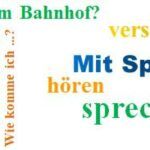In this lesson, I will discuss the essential features of pronunciation, spelling, and punctuation in German. The German alphabet is relatively straightforward; however, some sounds may require two, three, or even four letters, particularly among consonants. When it comes to vowels, it’s crucial to understand the rules that dictate when to pronounce a vowel as long and when to pronounce it as short.
Thank you for reading this post, don't forget to subscribe!CONTENTS
Sounds
Vowels
Umlauts
Consonants
Diphtongs
1. Sounds
The sounds are divided into:
Vowels (Vokale): a – e – i – o – u
Umlauts (Umlaute): ä /ae/ – ö /oe/ – ü /ui/
Diphthongs (Diphthonge): ai /I/ – ei /I/ – au /ou/ – äu/eu /oj/
Consontants (Konsonante): b – c – d – f – g – h – j – k – l – m – n – p – q – r – s – t – v – w –
x – z
Click on:
Grammar Contents
2. Vowels
We pronounce the vowels LONG if:
| 1. two same vowels stand together vowel + vowel | Staat, Tee, liegen* |
| 2. the vowel is followed by the letter “h”, which is not pronounced. vowel + h | zehn, wohnen, Sahne, fühlen** |
| 3. the vowel is followed by one consonant vowel + 1 consonant | Tag, Name, lesen, Brot |
We pronounce the vowels SHORT if:
| 1. vowels are followed by MULTIPLE consonants consonant + MORE consonants | Heft, Ordner, kosten, billig |
* (with “ie”, e is not pronounced, and “i” is pronounced long “liiigen”)
** when h stands after a vowel, it is NOT pronounced, and the vowel is long.
For example:
zehn = ‘tseen’
3. Umlauts
The same rules as for vowels apply to UMLAUTS. ( Long-short pronunciation)
4. Consonants
| VOWELS | PRONUNTIATION | EXAMLES |
| ch | ach/ich | Bach[bax], Buch[buːx], dich[dıç], Milch[mılç] |
| -chs | x | sechs[zəks], Fuchs[fʊks] wachsen [vaksən] |
| ck/k | k | Ecke, Kaffee |
| -dt | t | Stadt |
| -ig | ich | billig, lustig, König |
| h (at the beginning of a word) | h | Haus, woher (wo+her) |
| ph | f | Alphabet |
| qu | kv | bequem |
| s /ss | s* | Haus, Kassette |
| s | z | sehr, zusammen |
| ß | s | heißen, Straße |
| sch | sh[ʃ]: | schön, schwimmen |
| sp(at the beginning of the word) | shp**[ʃp]: | sprechen [ʃprehən] |
| st(at the beginning of the word) | sht**[ʃt]: | Stadt, bestellen (be- is prefiks) |
| v | f | Vater, vier, voll |
| v | v | Violine, Vase (the words of foreign origin) |
| w | v | Wien , Wasser, zwei |
| z | ts | Zimmer, zu |
| tz | ts | Platz, Katze |
| tsch | č | Deutsch, Tschechien |
- “s“ is pronounced like English ‘s’ at the end of a word
Click on:
Grammar Contents
5. Diphthongs
German features several diphthongs, which are vowel sounds that blend from one to another within a syllable. These combinations are represented in spelling by pairing two vowels.
The diphthongs “eu” and “äu” are pronounced like the English “oi,” as in the words “Eule,” “Europa,” and “läuft.”
The diphthong “au” is pronounced similarly to the diphthong in the English word “house,” but with a deeper ‘a’ sound, as in “Haus” or “laufen.”
The diphthongs “ei” and “ai” are pronounced like the English pronoun “I,” as seen in words like “Feile” and “Mai.” It is important to note the distinction between the diphthong “ei” and “ie,” which indicates a long ‘i’ sound, such as in the word “viele.”
| DIPHTHONG | PRONUNCIATION | EXAMPLES |
| au | au | Haus, auch |
| ai | aj | Mai |
| äu | oj | Häuser |
| ei | aj | ein, Seite |
| eu | oj | heute, Euro |
I hope these rules will be useful to you when learning to spell German.
Nikolina
See more:
German Alphabet with Pronunciation
Using Tenses in German
Tips For Improving German Vocabulary and Pronunciation
Thanks!, Please!, and Here we go! in German
German Phrases for Beginners

